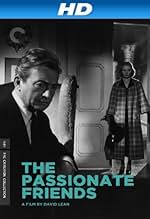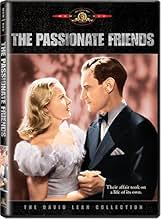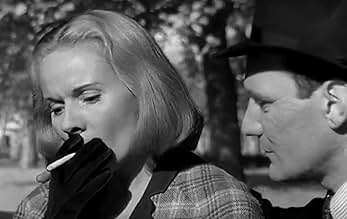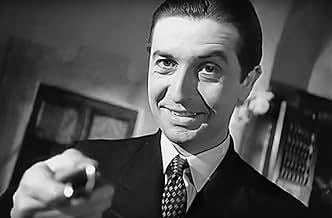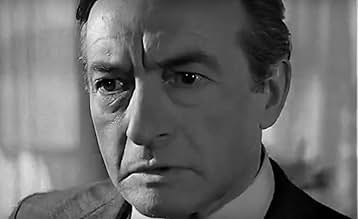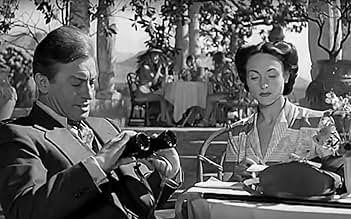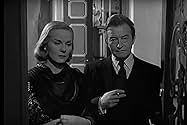CALIFICACIÓN DE IMDb
7.2/10
3.4 k
TU CALIFICACIÓN
Una mujer se encuentra con un hombre cuyo amor ella rechazó hace años.Una mujer se encuentra con un hombre cuyo amor ella rechazó hace años.Una mujer se encuentra con un hombre cuyo amor ella rechazó hace años.
- Premios
- 2 premios ganados y 1 nominación en total
Hélène Burls
- Flowerwoman
- (sin créditos)
Amy Dalby
- Lady on Underground
- (sin créditos)
Lisa Daniely
- Cinema Usherette
- (sin créditos)
Max Earle
- Third Man - Albert Hall
- (sin créditos)
Edward Evans
- Underground ticket officer
- (sin créditos)
Arthur Howard
- Smith - Butler
- (sin créditos)
John Huson
- First Man - Albert Hall
- (sin créditos)
Wilfrid Hyde-White
- Lawyer
- (sin créditos)
Charles Lloyd Pack
- Man Drinking with Stratton
- (sin créditos)
Guido Lorraine
- Hotel Manager
- (sin créditos)
Ina Pelly
- Second Woman - Albert Hall
- (sin créditos)
Helen Piers
- First Woman - Albert Hall
- (sin créditos)
Marcel Poncin
- Hall Porter
- (sin créditos)
Opiniones destacadas
This film surprised me a lot. I watched it merely out of curiosity; by the end of the film, I was struck by Ann Todd's performance and had to watch the film twice back-to-back. She expressed her character's inner turmoil so well that I wonder if she was playing herself. I profess I don't watch a lot of movies, barely up to 2,000 films. However, that is only because I am damn picky.
This is rather a mature story of romance. How a relationship could evolve from a marriage of convenience to a real thing of beauty between two people. How one's maturity could evolve from a real thing of passion to a mental state of contentment and stability. It's also a story of irrational jealousy that could potentially negate a prosperous family life.
This is a good example of a film where filmmakers do not have to resort to gratuitous, meretricious scenes to portray lust or passion.
This is rather a mature story of romance. How a relationship could evolve from a marriage of convenience to a real thing of beauty between two people. How one's maturity could evolve from a real thing of passion to a mental state of contentment and stability. It's also a story of irrational jealousy that could potentially negate a prosperous family life.
This is a good example of a film where filmmakers do not have to resort to gratuitous, meretricious scenes to portray lust or passion.
Invariably this film is bound to be compared to "Brief Encounter" and I guess that's to be expected given they were both directed by David Lean, starred Trevor Howard and featured adultery. Frankly I think any comparison to be unfair because that's where their similarities end. I've seen both and I favor "Passionate Friends". I should add that Ann Todd is not one of my favorite performers. Her demeanor can be expressionless and somewhat off putting. But here she truly shines. In Lean's extensive close ups she reveals inner feelings without uttering a word. And her smiles are explosively radiant. She utterly owns this part. The male parts are equally excellent. All the performances wrap the viewer with their passion and involve him in the characters' fates. This is not light viewing. It's an emotional roller coaster and as the climactic finale unfolded I found myself talking to the screen trying to influence the outcome. Without a doubt this is a story by adults, for adults. Highly recommended.
For The Passionate Friends David Lean treads similar ground as he does in his masterpiece, Brief Encounter, although here the source material is an HG Wells story as opposed to a Noel Coward play.
The post-war Lean, with his attention to psychology and emotions, handled these stories of problematic romance brilliantly, and The Passionate Friends is a great example. We open with clouds and snow-capped mountains, a holiday location that foreshadows Lean's Summertime (1955), straight away giving us a sense of dreaminess and soaring emotions.
This is Lean at his most psychological and expressionist. The sound and imagery is always calculated to mirror feelings – like the abruptness of the plane wheel touching the ground when Claude Rains returns from his trip abroad. The acting really supports this too. Considering it's a story about a love triangle, a large amount of the story is told through scenes in which one of the three principal characters is alone, or at least unobserved, and the actors convey inner thoughts through subtle expressions and gestures.
Also, like the bulk of Lean's pictures from this era there are references to the war and the impact it had on British society. It's probably no coincidence that the decision was made to set the flashbacks of the affair in 1939 (Wells' original story was decades older), the year that war broke out. The cold, bureaucratic Claude Rains seems to be in part symbolic of the necessity in wartime to be rational and emotionless, and the story is an allegory for the need to break away from that.
While it is a good story and very well-made, The Passionate Friends is unfortunately no Brief Encounter. On the acting side, Claude Rains is brilliant as always, but I'm less convinced by Ann Todd, who perhaps got the part more because she was Mrs Lean that for her talent. The plot can be a bit confusing with its flashbacks within flashbacks. Probably the biggest problem though is that we never get to totally empathise with the characters. While Brief Encounter's sheer ordinariness made it so universal, you don't get this to the same degree here, and that makes it by far the weaker of the two pictures. Still, it's by no means a disaster, and still one of the better films of David Lean's 1940s output.
The post-war Lean, with his attention to psychology and emotions, handled these stories of problematic romance brilliantly, and The Passionate Friends is a great example. We open with clouds and snow-capped mountains, a holiday location that foreshadows Lean's Summertime (1955), straight away giving us a sense of dreaminess and soaring emotions.
This is Lean at his most psychological and expressionist. The sound and imagery is always calculated to mirror feelings – like the abruptness of the plane wheel touching the ground when Claude Rains returns from his trip abroad. The acting really supports this too. Considering it's a story about a love triangle, a large amount of the story is told through scenes in which one of the three principal characters is alone, or at least unobserved, and the actors convey inner thoughts through subtle expressions and gestures.
Also, like the bulk of Lean's pictures from this era there are references to the war and the impact it had on British society. It's probably no coincidence that the decision was made to set the flashbacks of the affair in 1939 (Wells' original story was decades older), the year that war broke out. The cold, bureaucratic Claude Rains seems to be in part symbolic of the necessity in wartime to be rational and emotionless, and the story is an allegory for the need to break away from that.
While it is a good story and very well-made, The Passionate Friends is unfortunately no Brief Encounter. On the acting side, Claude Rains is brilliant as always, but I'm less convinced by Ann Todd, who perhaps got the part more because she was Mrs Lean that for her talent. The plot can be a bit confusing with its flashbacks within flashbacks. Probably the biggest problem though is that we never get to totally empathise with the characters. While Brief Encounter's sheer ordinariness made it so universal, you don't get this to the same degree here, and that makes it by far the weaker of the two pictures. Still, it's by no means a disaster, and still one of the better films of David Lean's 1940s output.
The Passionate Friends is the first of three films that director David Lean made with Ann Todd in and she gives a fine performance in this mannered British melodrama that evokes in ways two other popular British films of the era, Lean's Brief Encounter and the Todd starring The Seventh Veil.
Former lovers Mary Justin (Todd) and Steven Stratton (Trevor Howard) meet accidentally at a New year's party and rekindle lost feelings. Trouble is she is married to a wealthy banker Howard Justin (Claude Rains) and Stratton's in a committed relationship. Justin discovers the affair however and puts an end to it. Nine years pass and they meet again while vacationing. Stratton is now married with kids but Howard thinks otherwise and files for divorce. Mary becomes desperate and suicidal.
With quality performances (especially Rains) from all of the leads The Passionate Friends is credible melodrama that overachieves with Lean displaying his superb grasp of film language, employing jump cuts, montage and juxtaposition for maximum effect. With a few Hitchcock like flourishes along the way he does an excellent job of keeping the audience guessing right up until the final minutes. It is this subtle triumph of form that makes The Passionate Friends a superior example of its genre.
Former lovers Mary Justin (Todd) and Steven Stratton (Trevor Howard) meet accidentally at a New year's party and rekindle lost feelings. Trouble is she is married to a wealthy banker Howard Justin (Claude Rains) and Stratton's in a committed relationship. Justin discovers the affair however and puts an end to it. Nine years pass and they meet again while vacationing. Stratton is now married with kids but Howard thinks otherwise and files for divorce. Mary becomes desperate and suicidal.
With quality performances (especially Rains) from all of the leads The Passionate Friends is credible melodrama that overachieves with Lean displaying his superb grasp of film language, employing jump cuts, montage and juxtaposition for maximum effect. With a few Hitchcock like flourishes along the way he does an excellent job of keeping the audience guessing right up until the final minutes. It is this subtle triumph of form that makes The Passionate Friends a superior example of its genre.
I was surprised to learn that the original story for The Passionate Friends was written by H.G. Wells. Someone nowadays we identify with the science fiction genre. Certainly it seems to be what has survived best in English literature.
The original story was written in 1913 so some considerable updating was done to make it 1949 contemporary. Lovers Ann Todd and Trevor Howard had an affair back in the day which was ended when Todd's husband Claude Rains found out.
Eleven years go by and Todd and Howard meet at a mountain ski resort in Switzerland. Howard's now married and moved on, but they spend an innocent afternoon reminiscing. Rains catches them and misinterprets with near tragic results.
Ann Todd may be one of the most beautiful women ever to grace the silver screen. She's probably best known in America for being Gregory Peck's loyal wife in The Paradine Case. No wonder Rains is so jealous.
Trevor Howard is essentially doing the same part for David Lean that first got him stardom in Brief Encounter. In fact the story could almost be what happens to the protagonists in Brief Encounter if they met up again in the future. Claude Rains is always right on the money with his portrayals. There's a lot of what John Barrymore did in Maytime in what Rains does here.
If it were done here in the USA, this would have been labeled a woman's picture. It is in fact a nicely done romantic story.
The original story was written in 1913 so some considerable updating was done to make it 1949 contemporary. Lovers Ann Todd and Trevor Howard had an affair back in the day which was ended when Todd's husband Claude Rains found out.
Eleven years go by and Todd and Howard meet at a mountain ski resort in Switzerland. Howard's now married and moved on, but they spend an innocent afternoon reminiscing. Rains catches them and misinterprets with near tragic results.
Ann Todd may be one of the most beautiful women ever to grace the silver screen. She's probably best known in America for being Gregory Peck's loyal wife in The Paradine Case. No wonder Rains is so jealous.
Trevor Howard is essentially doing the same part for David Lean that first got him stardom in Brief Encounter. In fact the story could almost be what happens to the protagonists in Brief Encounter if they met up again in the future. Claude Rains is always right on the money with his portrayals. There's a lot of what John Barrymore did in Maytime in what Rains does here.
If it were done here in the USA, this would have been labeled a woman's picture. It is in fact a nicely done romantic story.
¿Sabías que…?
- TriviaThis movie is based on the 1913 novel "The Passionate Friends" by H. G. Wells, who also wrote "The Invisible Man", which was made into a 1933 hit movie starring Claude Rains, one of the stars in this movie.
- ErroresWhen Steven barges into Howard's office, he is shown starting to close the door, followed by the sound of a door closing. However, in the subsequent shot, the door is open again.
- Citas
Mary Justin: I'm not a very good person, Steven. I wanted your love - and I wanted Howard's affection and the security he could give me.
Professor Steven Stratton: I can give you security too, and more than affection.
Mary Justin: You don't really know me at all. My love isn't worth very much.
- ConexionesFeatured in Discovering Film: Claude Rains (2015)
Selecciones populares
Inicia sesión para calificar y agrega a la lista de videos para obtener recomendaciones personalizadas
- How long is The Passionate Friends?Con tecnología de Alexa
Detalles
- Fecha de lanzamiento
- País de origen
- Idiomas
- También se conoce como
- The Passionate Friends
- Locaciones de filmación
- Le Brévent, Chamonix, Haute-Savoie, Francia(cable car outing at Brévent in front of Pic du Midi)
- Productora
- Ver más créditos de la compañía en IMDbPro
Taquilla
- Total a nivel mundial
- USD 40,335
- Tiempo de ejecución
- 1h 35min(95 min)
- Color
- Relación de aspecto
- 1.37 : 1
Contribuir a esta página
Sugiere una edición o agrega el contenido que falta


